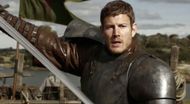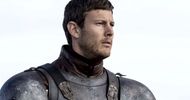Season 6 of Game of Thrones gave audiences their first look at Dickon Tarly during an uneasy dinner at Horn Hill. Samwell’s younger brother, played then by Freddie Stroma of Pitch Perfect and UnREAL fame, appeared dutiful in tone and subdued in presence, which only highlighted the overbearing nature of their father, Randyll.
The role seemed like little more than a footnote, but the following year’s scripts had far bigger plans. Dickon was set to ride into Daenerys Targaryen’s war against the Lannisters and later meet the same fiery end as his father when both refused to bend the knee.
The shift in focus clashed with Stroma’s reality. By the time cameras rolled for Season 7, he was already contracted as the lead in ABC’s sci-fi series Time After Time, portraying H.G. Wells. That commitment left no space for Westeros. HBO responded by handing the role to Tom Hopper, recognizable from Merlin and destined for The Umbrella Academy.
Hopper’s Dickon wasn’t a quiet dinner guest. He was a soldier on horseback in the Loot Train Battle, a man standing beside Jaime Lannister, and ultimately a casualty of dragonfire. Fans caught the recast instantly, but the explanation wasn’t any scandal or disagreement; it was only timing, scheduling, and the demands of two different productions.
Why Game of Thrones had to replace Freddie Stroma with Tom Hopper

Game of Thrones had swapped faces before: Daario Naharis changed, the Three-Eyed Raven changed, and even Tommen Baratheon changed, so the replacement of Dickon Tarly was not a first. What set this one apart was speed. A brother glimpsed briefly in Season 6 was suddenly asked to become a fighter, a son of consequence, and a man given far more weight in Season 7.
Into that gap walked Tom Hopper. His job was not just to inherit a name but to carry it through fire and battle. He was placed on horseback, positioned against Jaime Lannister in strategy, and confronted Daenerys Targaryen in defiance. His words marked where the Tarly line stood, once with Tyrell, now unwillingly with Lannister.
The decision had nothing to do with storylines or disputes. Freddie Stroma had no opening in his calendar. Time After Time was shot in the same block of months as Game of Thrones Season 7, and as H.G. Wells, he was locked in. HBO could only move on.
Unlike his brief dinner scene in Season 6, the expanded arc in Season 7 required weeks of filming, horse training, and action choreography. Hopper had the physical presence and television background that fit the new demands, making him an easy choice for the upgrade.
The change also gave Dickon Tarly a more defined personality on screen. While Stroma’s version showed a polite younger son with little to say, Hopper’s performance emphasized duty and honor, especially during the Loot Train Battle.
His scenes with Jaime demonstrated his courage on the field, while his refusal to kneel before Daenerys highlighted how the Tarly family valued loyalty to their house above survival. This added weight to the moment when Randyll and Dickon were executed by dragonfire, leaving Sam devastated when he later learned of their deaths.

Fans quickly noticed the recasting, but Hopper’s larger role made it easier for viewers to accept it. Unlike some of the earlier switches, where characters returned looking very different with little explanation, Dickon’s transformation happened at a point where the story clearly required a stronger presence.
The transition was not framed as a creative shift or rewrite; it was simply the result of scheduling that forced HBO’s hand. In the end, Hopper’s Dickon delivered some of the most memorable moments of Game of Thrones Season 7, ensuring the character left a lasting impression despite his short run.
Follow for more updates.
